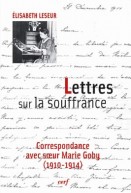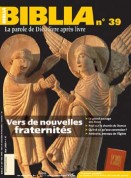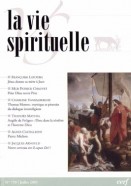Journal et pensées de chaque jour
Collection Intimité du christianisme
320 pages - nov. 2005
30,00€
Née dans une famille de la bourgeoisie parisienne, Élisabeth Arrighi (1866-1914) a compris et pratiqué sa foi comme laïque chrétienne de manière créative et originale. Mariée à 23 ans avec Félix Leseur, incroyant militant, qu'elle aimait très profondément, elle adopta auprès de lui et dans son milieu un comportement d'apôtre, caractérisé par une présence attentionnée et inconditionnellement aimante. Malade, ne pouvant avoir d'enfant, elle affronta avec courage et intelligence la question de la souffrance. Ses nombreux voyages et lectures lui donnèrent une vision très large du monde et une grande sensibilité aux différents courants de pensée et aux différentes formes de croyance et d'incroyance. Elle fut particulièrement sensible à l'enseignement social de Léon XIII et à l'action des mouvements laïcs de son époque. De 1899 à 1914, elle consigna ses réflexions, prières et règles de vie dans son Journal. À la mort de son épouse, très profondément touché par la lecture de son Journal, Félix Leseur se convertit et entra, peu de temps après, dans l'ordre des Prêcheurs. Il devint l'homme d'une mission : faire connaître les écrits de son épouse. Il fit publier le Journal (1917) qui, en 1954, avait atteint 140 000 exemplaires et qui fut traduit en huit langues (anglais, italien, portugais, espagnol, néerlandais, polonais, chinois et tchèque) ainsi que d'autres ouvrages et recueils de correspondances d'Élisabeth Leseur. Les écrits d'Élisabeth Leseur sont d'une très grande santé humaine et spirituelle. Ils pourront aider les chrétiens d'aujourd'hui, en particulier les laïcs, notamment ceux qui vivent avec un conjoint incroyant.
--
Born into a bourgeois family in Paris, Élisabeth Arrighi (1866-1914) understood and practiced her faith as a lay Christian in a creative and original manner. Married at the age of 23 to Félix Leseur, a militant non-believer whom she loved deeply, she adopted the behaviour of an apostle toward her husband and her surroundings, an attitude that was manifested in a caring and unconditionally loving presence. Sick and unable to have children, she faced the problem of suffering with courage and intelligence. Her travelling and reading gave her a broad vision of the world and a great sensitivity to different ways of thinking and forms of belief or non-belief. She was especially receptive to the social teaching of Pope Leo XIII and the action of the secular movements of those times. From 1899 to 1914, she noted her thoughts, prayers and rules of life in her diary. When his wife died, deeply moved by reading her diary, Félix Leseur became a Christian and a short time later, joined the Order of Preachers. He was invested with a mission: to make his wife’s diary known. He published the Diary in 1917 and by 1954, it had sold 140 000 copies and been translated into 8 languages (English, Italian, Portuguese, Spanish, Dutch, Polish, Chinese and Czech), as were other works and writings by Elisabeth Leseur. Of great human and spiritual equilibrium, Elisabeth Leseur’s works can help Christians today, especially lay-people, and those who live, as she did, with a non-believer.
--
Born into a bourgeois family in Paris, Élisabeth Arrighi (1866-1914) understood and practiced her faith as a lay Christian in a creative and original manner. Married at the age of 23 to Félix Leseur, a militant non-believer whom she loved deeply, she adopted the behaviour of an apostle toward her husband and her surroundings, an attitude that was manifested in a caring and unconditionally loving presence. Sick and unable to have children, she faced the problem of suffering with courage and intelligence. Her travelling and reading gave her a broad vision of the world and a great sensitivity to different ways of thinking and forms of belief or non-belief. She was especially receptive to the social teaching of Pope Leo XIII and the action of the secular movements of those times. From 1899 to 1914, she noted her thoughts, prayers and rules of life in her diary. When his wife died, deeply moved by reading her diary, Félix Leseur became a Christian and a short time later, joined the Order of Preachers. He was invested with a mission: to make his wife’s diary known. He published the Diary in 1917 and by 1954, it had sold 140 000 copies and been translated into 8 languages (English, Italian, Portuguese, Spanish, Dutch, Polish, Chinese and Czech), as were other works and writings by Elisabeth Leseur. Of great human and spiritual equilibrium, Elisabeth Leseur’s works can help Christians today, especially lay-people, and those who live, as she did, with a non-believer.
- Dimensions : 145x215x25
- ISBN : 9782204070829
- Poids : 460 grammes
Avec la collaboration de : Janet Ruffing
DU MÊME AUTEUR
> VOIR TOUS LES LIVRES DE l'AUTEUR








